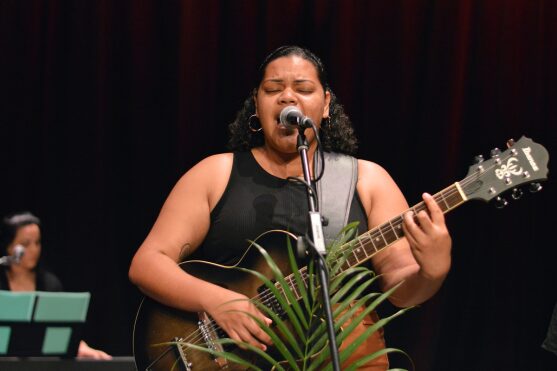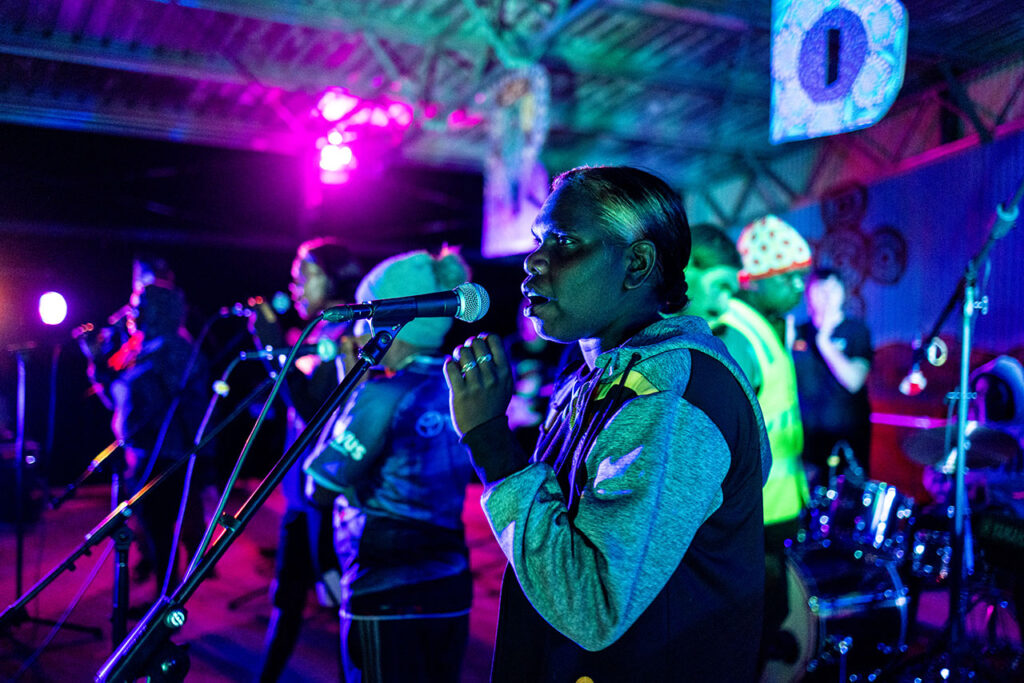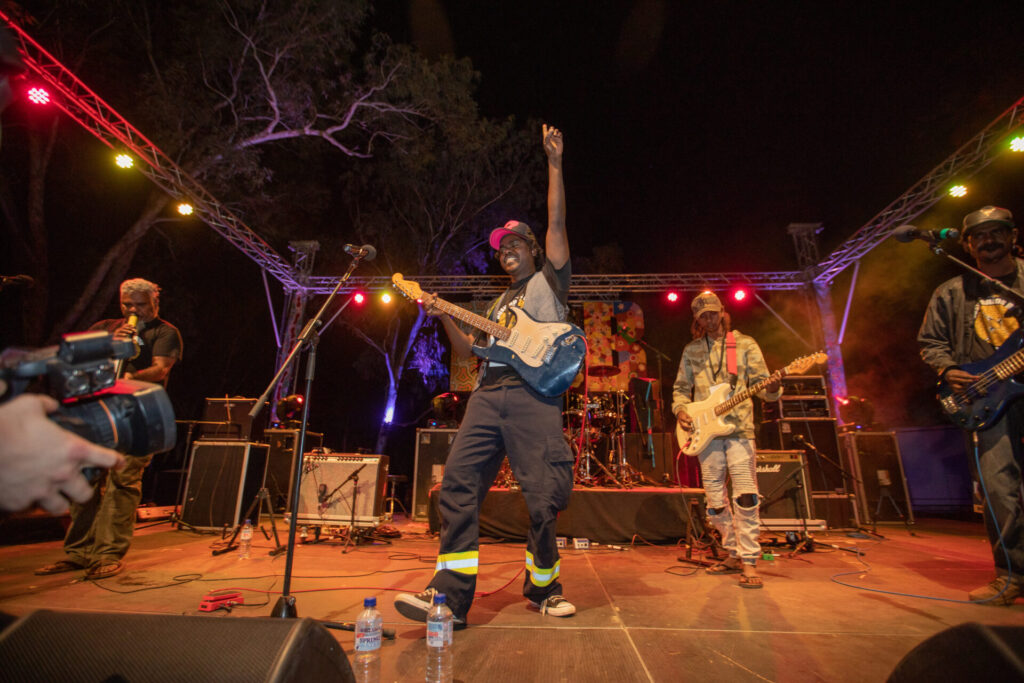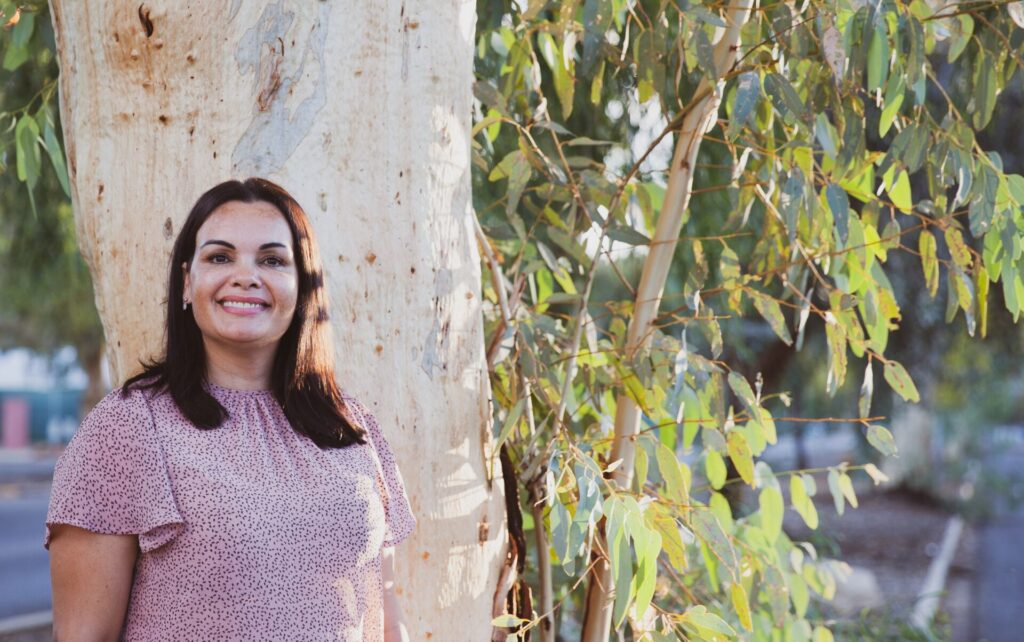Road to success: Innovative MusicNT puts Territory musicians on the map

If you’re driving the 1,500km from Alice Springs to Darwin, you’ll want lots of music to keep you company and you’ll need to stop for food and fuel. Cue the supremely innovative idea to scan different QR codes at roadhouses en route connecting you to digital playlists of local contemporary First Nations recording artists from each region you’re travelling through.
This is an article originally published in Inspiring Stories of Giving Vol 2 in August 2024.
Your Soundtrack to the Outback is just one of the exciting programs produced by the not-for-profit and peak body MusicNT, whose mission is to grow the Territory’s industry – and share the powerhouse creativity of its artists across Australia.
“The goal was to encourage people to invest in the local communities with those businesses and to create a personal connection to the music and experience of being in the Territory,” said Mark Smith, who has been Executive Director of MusicNT for nearly two decades.
“Music from the Territory is taking over stages across the world. Reflecting thousands of years of history, as well as the melting pot of cultures that is the Top End, NT music is the heartbeat of the nation. The country is just catching up to how great the songs and musicians of the NT are!” he said.

MusicNT supports 3,500 members with programs, events, workshops, mentoring, recording opportunities and industry contacts. The organisation has received a three-year operational grant from the Tim Fairfax Family Foundation (TFFF), which Mark said is a gamechanger. “I wish more funders would do it. It’s the missing link,” he said. “It’s given us validation as an organisation, protection from the perils of the live event industry and increasingly fraught government funding model and freedom to grow,” he said.
“It still feels as if there are new ideas, opportunities and fresh audiences out there to discover NT music. I’m passionate about making a difference in whichever way we can.”
The relationship with the TFFF has developed over years. Foundation Trustees Tim Fairfax AC and Gina Fairfax AC recognised MusicNT’s leadership over ten years ago, and supported the early growth of its Sista Sounds program. Then there was a one-off capacity building grant co-funded with the Sidney Myer Fund, which is when Mark first met TFFF’s now CEO, Neal Harvey. A good while later, Mark was put in contact with TFFF Program Manager, Hannah Barr, and they kept in touch with “regular conversations but they weren’t transactional”.
“They were about where the organisation was, what we were up to, what the plans were for the future. Those conversations slowly coalesced into a more formal discussion around this funding opportunity,” he said. “MusicNT had developed over that time too, and suddenly it was the ‘right time, right place’, even though that had taken years to evolve,” said Mark.
“It’s a critical time to receive operational funding because we’re in the middle of doubling our staff. It also means you can achieve something over the long term. It’s a really important opportunity,” said Mark.
MusicNT runs live events, including the Bush Bands Bash, in which 160 bands have performed, and the National Indigenous Music Awards, which celebrates its 20th year in 2024. And 150 women have benefitted from the women’s programs, Sister Sounds and Desert Divas. “The beauty of Desert Divas is that a number of the women who went through it are now employed to deliver the program,” said Mark.

“MusicNT’s overarching ethos is equity of access, so I hope this funding will help us continue to be relevant for musicians regardless of whether they’re in a remote community or in Darwin,” said Mark.
Through the TFFF, Tim and Gina Fairfax have assisted Queensland and Northern Territory communities with more than $70 million since 2008. Like MusicNT, the Foundation’s mission is to ensure people living in rural, regional, and remote geographies have the same opportunities as those in urban areas. The TFFF funds organisations and endeavours which strengthen connection, resilience, and leadership, and it favours multi-year, operating support in recognition that this is the greatest need for many for-purpose organisations. “That means,” said Neal, “finding good people doing good work, and resourcing them to get on with it.
“Mark is absolutely one of those people. It’s been incredible to watch that organisation’s growth in his time. Mark is incredibly well-connected across northern Australia, understands community needs and is trusted by the communities, which make MusicNT an ideal partner for TFFF,” he said.
“There’s strong evidence that arts and culture are key drivers of social cohesion and wellbeing. But touring and freight is expensive, insurances are needed – all these challenges make it difficult for metro arts organisations to get out to the regions. Tim and Gina are interested in supporting those organisations in the regions already doing the great work,” said Neal.
“If Australia is to become the cultural powerhouse we want to be, we want our art and our artists, particularly First Nations artists, to be celebrated and loved. That’s going to require funding and support.
“It’s very difficult for future generations to become what they can’t see. MusicNT provides mission-critical leadership and opportunity Territory communities,” said Neal.
Building the capacity of regional organisations is on the national agenda and Creative Australia and government are holding the first Regional & Remote Music Summit in Darwin in August. MusicNT and.
Catherine Satour, a singer-songwriter from Alice Springs, who is Pertame Arrernte and Mirning, grew up watching her father Bunna Lawrie and his legendary band Coloured Stone. She was a founding member of Desert Divas and is now also Vice Chair of MusicNT. She said the local music industry was very male-dominated when she was an emerging artist, but she has helped change that. “MusicNT provided me with my first professionally produced tracks when I was starting out, which was amazing and helped open doors. I had the most incredible support and they’ve been along for the whole journey,” she said.

They released the first-ever indigenous women compilation album, Desert Divas Vol 1, featuring 10 artists from 10 language groups. Now, she said, she loves working with up-and-coming artists who have big ambitions. “It’s all about supporting the development of the industry and fostering a wider audience for the rich diversity of musicians in the Territory,” she said.
She said the impact is broader than just the music. “I feel like the ‘Mum Diva’ now. There are sometimes complex issues about community and culture, outside of the ‘program’. It’s all about providing holistic support, but when you see those women doing well and getting gigs on stage and getting paid for their music works and phenomenal songs are being made, it’s all so worthwhile,” she said. “We’ve got to keep providing that space.”
Mark has more innovative programs up his sleeves. He’s working on a loyalty program for live events to help rebuild the audience base severely dented by COVID. And the next stage of Your Soundtrack to the Outback will incorporate ‘drive yourself’ music trails offering a variety of curated musical experiences, such as concerts or workshops.
“The Territory has a vision of dramatically increasing its population and re-establishing itself in the post-COVID era. Our argument is that our significant point of difference is the creative and cultural element – and our artists. Tourism and the government have an opportunity to really invest locally and say, ‘This is our story and this is the reason people will travel to the Territory’.”